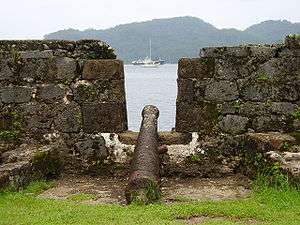Portobelo District
| Portobelo District | |
|---|---|
| District | |
 | |
 | |
 Portobelo District Location of the district capital in Panama | |
| Coordinates: 9°33′N 79°39′W / 9.550°N 79.650°WCoordinates: 9°33′N 79°39′W / 9.550°N 79.650°W | |
| Country |
|
| Province | Colón Province |
| Capital | Portobelo |
| Area | |
| • Total | 152 sq mi (394 km2) |
| Population (2004) | |
| • Total | 9,193 |
| Time zone | ETZ (UTC-5) |
The Portobelo district[1] is one of the divisions that make up the Colón Province, Panama. The district capital is the city of Portobelo.
History
The site on which to found Portobelo was discovered on November 2, 1502 by Admiral Christopher Columbus, on his fourth voyage aboard the Santa Maria thinking he had found Kataya step.
It was founded on March 20, 1597 by Francisco Velarde and Markets, replacing the city of Nombre de Dios, since it was disabled by your weather conditions. In this prosperous village was deposited all the gold from the Spanish colonies in South America. The gold from Peru, loaded on mules across the Camino de Cruces from Panama City to the town of sales and then transported by boat on the Rio Chagres to Portobelo, where they were shipped to Panama, re-embarked for Spain.
He was also famous for its fairs, which lasted for forty (40) days. The first fair was launched in the year 1606 in the name of God and then were moved to Portobelo, by position. The last show was in the year of 1739.
Political-Administrative Division
It consists of five townships:
- Portobelo
- Cacique
- Garrote
- Big Island
- Maria Chiquita
Culture
On October 21, Portobelo becomes the scene of one of the major religious traditions in Panama. These are the feasts of the Black Christ when pilgrims congregate from around the country. Some are walking long distances in payment for favors granted by the miraculous Nazarene. Others come from or carrying heavy crosses knees in penitence. During each year is visited by many pilgrims, but hikers do it only for the week of October 21.
Legend has it that the image of the Nazarene arrived in the late eighteenth century on a ship whose destination was Peru, but that bad weather forced it to disembark in Portobelo. The popular narrative has two aspects, one notes that some fishermen found it floating in the holy waters of the Caribbean and another, a Spanish Galleon Shield landfall due to bad weather, with two images on board, one of a white Christ and another of a black Christ. Each time the ship tried to sail with its cargo, a storm prevented it. After several attempts, the Spanish decided to leave the black Christ in Portobelo and were finally able to leave.